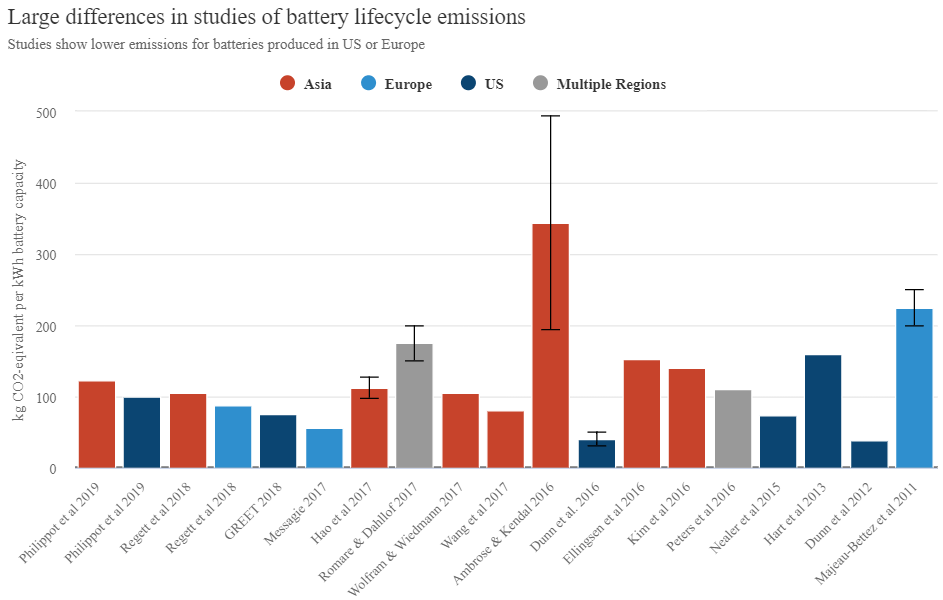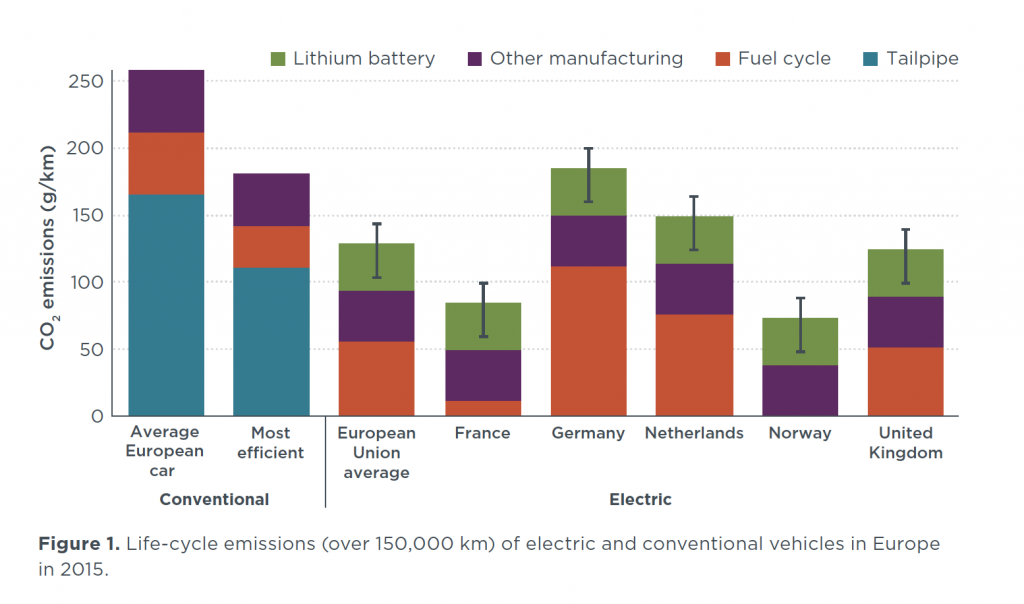

REVIEW
CLAIM: New Study Confirms EVs Considerably Worse For Climate Than Diesel Cars
SUMMARY
Electric vehicles (EVs) are far from zero emissions, as both electricity generation and battery production are large sources of greenhouse gas. However, numerous studies show that EVs are responsible for considerably lower emissions over their lifetime than a typical conventional (internal combustion engine) vehicles across both the US and Europe.
In countries with coal-intensive electricity generation, the benefits of EVs are smaller, and they have similar lifetime emissions to the most efficient conventional vehicles—such as hybrid-electric models.
However, as countries decarbonize electricity generation to meet their climate targets, driving emissions will fall for existing EVs and manufacturing emissions will fall for new EVs.
Comparisons between electric vehicles and conventional vehicles are complex, and depend on the size of the vehicles, the accuracy of the fuel economy estimates used, how electricity emissions are calculated, what driving patterns are assumed, and even the weather in regions where the vehicles are used. There is no single estimate that applies everywhere.
Emissions from the production of electric vehicle batteries in Tesla’s gigafactory are likely considerably smaller than those assumed in the (not peer-reviewed) study cited by Zero Hedge, which relies on a review article primarily examining batteries produced in Asia.

The figure below, from an analysis by the International Council for Clean Transportation (ICCT), shows an estimate of lifecycle emissions for a typical European conventional (internal combustion engine) car, the conventional car with the best available fuel economy (a Peugeot 208 1.6 BlueHDi), and a Nissan Leaf electric vehicle for various countries as well as the EU average. It includes tailpipe emissions (blue), emissions from the fuel cycle (red)—which includes oil production, transport, refining, and electricity generation—emissions from manufacturing the non-battery components of the vehicle (purple) and emissions from manufacturing the battery (green).

Even in the countries with the greatest fuel cycle emissions, the overall lifecycle emissions of the Leaf are below the average car, and comparable to the most efficient conventional car.
Other recent studies of electric cars in Germany have reached the opposite conclusion. One study found that emissions from EVs have emissions up to 43% lower than diesel vehicles. Another detailed that “in all cases examined, electric cars have lower lifetime climate impacts than those with internal combustion engines”.
For more information, see this article at Carbon Brief.
The general premise that EVs are not currently a panacea for climate change and that the life cycle greenhouse gas emissions from electric vehicles can be similar to or even greater than the most efficient gasoline or diesel vehicles is supported by other research, including the work of my group over the past decade. But it’s important to note that which technology comes out on top depends on a lot of things, especially:
- which specific vehicles are being compared,
- what electricity grid mix is assumed (especially whether or not the question is about the *change* in generation induced by new load, which is basically a mix of fossil fuels even in regions with wind, solar, hydro, and nuclear),
- what driving patterns are assumed, and even
- the weather
See, for example, the maps in this study1, which examine these effects regionally. Whether electric beats gasoline/diesel depends heavily on which electric and gasoline/diesel vehicles are being compared and under what conditions. Here is our 2-page policy brief summarizing these issues.

Studies that compare EVs (which are mostly smaller cars) to an average gasoline or diesel vehicle (much larger) and assign the average grid mix in an area to the electric vehicle tend to have favorable findings for EVs. Studies that compare EVs to comparable gasoline or diesel vehicles and examine the consequential emissions (how the grid will change in response to buying an EV vs. a gasoline/diesel vehicle) tend to have findings that are more mixed. I would put more weight on the second type of study and put more weight on peer-reviewed academic studies than on studies by advocacy groups or consulting groups that are not fully transparent.
Emissions from battery manufacturing do not dominate life cycle emissions, but they are a not-insignificant portion of life cycle emissions. For vehicles with large battery packs, like Teslas, the emissions from battery manufacturing are a larger part of the picture and can tip the balance, relative to EVs with smaller batteries. We identified this some time ago in a study here[1]. There have been a variety of studies estimating emissions from battery production. The range used by the authors (145kg to 195kg CO2 per kWh of battery capacity) is within the range of estimates in the peer-reviewed scholarly literature, but it is higher than the most favorable studies that include battery recycling credits.
- [1] – Yuksel et al (2016) Effect of regional grid mix, driving patterns and climate on the comparative carbon footprint of gasoline and plug-in electric vehicles in the United States, Environmental Research Letters
Volker Quaschning, Professor, Hochschule für Technik und Wirtschaft HTW Berlin, Universit:
The study has serious scientific errors. It always chooses the most favorable values for all the assumptions for the diesel, and always uses the worst-case values in the known bandwidth to calculate the impact of EV, and sometimes uses already refuted studies.
In Germany, some articles have also appeared in major leading media, which deal very well with the mistakes.


